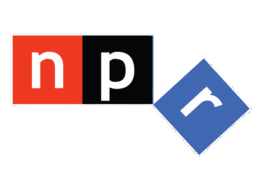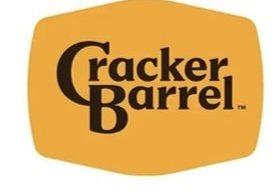
It may seem hard to believe but one of radio’s longest running get-togethers is actually a collection of on-air talent, mostly from commercial stations. They come from near and far, representing big companies as well as mom & pops, morning shows and syndicated programs, as well as talent working a myriad of dayparts, markets, and situations.
That’s the way radio has evolved in recent years. And as we’ve learned from our AQ studies of commercial radio talent over the past several years, today’s personalities wear an average of “3 hats.” Remarkably, about one-third don “4 hats” or more as part of their expanding job responsibilities as part of industry demands that require more than ever while often delivering less in return—compensation, time off, and emotional rewards.
But talent soldiers on, mostly with a big smile on their collective faces, still glad to be part of a business unlike any other. And at this year’s Boot Camp in Austin—#37 if you’re counting—they once again showed up in droves, braved the Texas heat in August, and enjoyed each other’s company, camaraderie, and generosity.
That last point is key. This is a group that graciously shares their knowledge and experiences with the next generation of air talent. Now, if you’re cynically thinking, “Fred—there is no next generation of radio personalities,” I would suggest you think again. Because a look at Morning Show Boot Camp attendees is a glimpse of what’s next. Most of those who make the trek to this event are young—to the point where guys like me feel our age—and are happy about that. A majority also pay their own way, so the value of Boot Camp is high—and so are the expectations for the conference itself.
The thing about Boot Camp that sets it apart from other radio conferences—across radio platforms—is the unbridled passion and energy you feel everywhere—in the main presentation area, the sponsor exhibits area, in the restaurants and bars. It’s everywhere and it’s a defining difference.
Talent at this event are realistic and well-aware of the tense dynamic between their ilk and management—especially these days, when salaries and marketing resources have greatly dwindled, more so since the pandemic.
But most seem undaunted by the shifting sands of radio, excited to try the next stunt they learned about in this year’s “Battle of the Bits,” a Boot Camp tradition that seems to grow with each passing year. For corporate officers, consultants, talent coaches and others mostly on the periphery, this event makes you feel hopeful and inspired by what may be around the corner.
In case you didn’t know, Morning Show Boot Camp is the brainchild of Talent Masters founder Don Anthony. He staked out this turf decades ago on the belief the radio business could only be successful with a commitment to on-air personalities. All these years later, and Boot Camp is a symbol of Don’s very prescient “all in” bet on the power of talent.
Yet, there are times when the commercial radio “powers that be” seem to struggle with the obvious. While most would admit to the importance of quality talent and their content, many radio execs are conflicted by talent costs and commitments. And let’s not forget that when it’s time to downsize and throw a bone to Wall Street, public companies often include on-air talent on lists of those who will be the target of the next round of cutbacks.

Photo credit: The Radio Fam
When I attend Boot Camp, it’s always a gut check for me as I typically don’t spend as much meaningful time with talent these days. Thus, a couple days at this conference is almost a bonding experience, a chance to witness first-hand how personalities approach their followers, their needs, and how they grow their brands—whether they stayed with the same company as last year or they’ve moved on to the next opportunity.
The last few years, Don and Jacobs Media have collaborated on unique research studies conducted among commercial radio talent in the U.S. With six AQ studies in the books, we decided on something different for Boot Camp this year. I dug into these past research studies to determine, research, and greater understand some of the facts we’ve already learned.
Then with the help of a great panel—Nikki Nite (Audacy/Austin), J-Si Chavez (The Kidd Kraddick Show), Bret Mega (a new syndicated show headquartered in St. Louis), Bert Weiss (The Bert Show), and Jess Dutra (one half of Audacy’s Hot AC morning show in Baltimore)—we had a serious conversation about those AQ findings. These panelists talked through our data, providing perspective on a number of topics, including the mental toll of radio in 2025, the number of “hats” being worn these days, work/life balance, and talent discovery/development.
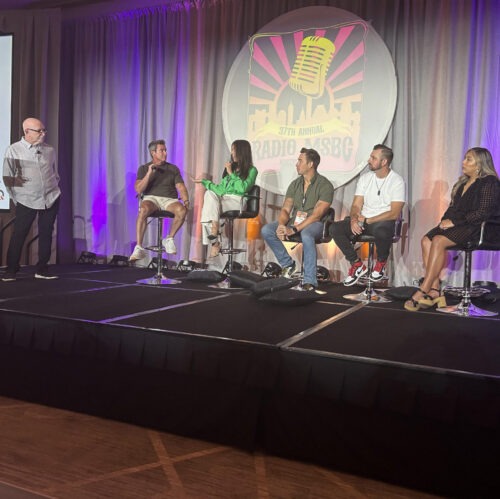
L-R: Bert Weiss, Nikki Nite, J-Si, Bret Mega, Jess Dutra | Photo credit: John Shomby
On the “hats” front, the slide below shows the contrast between the folks who attended Boot Camp this year (on the right below) versus our AQ6 sample from last summer (below right). As you can see, everyone is busy. But the types of people who attend this conference specializing in on-air radio talent are decidedly busier, performing more radio tasks.
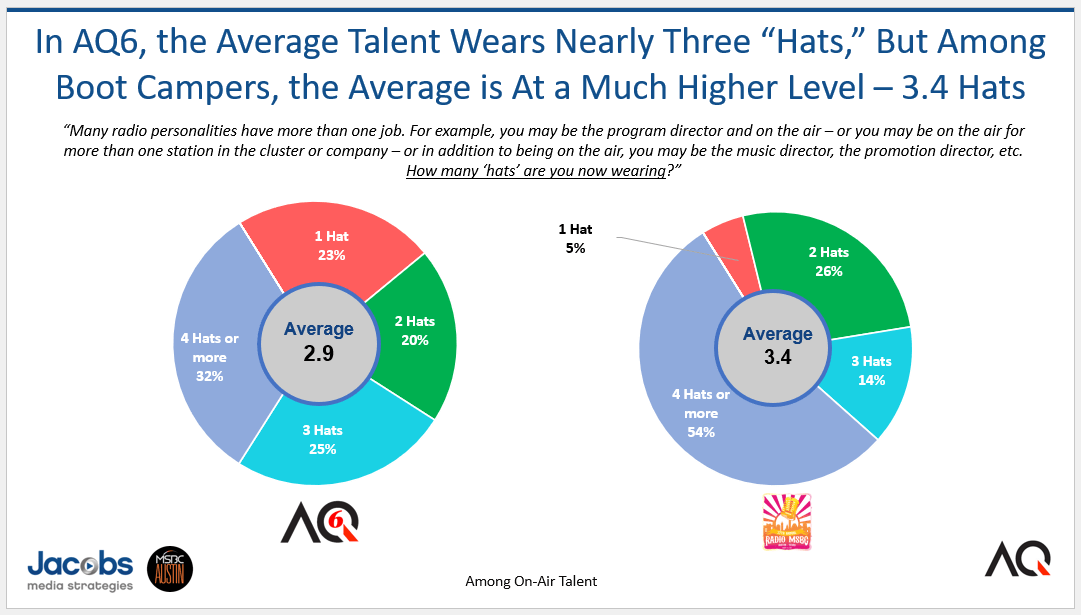
Another key contrast revolves around the type of radio talent has chosen to work in. Earlier this year, we conducted a very similar study to AQ for the Christian Music Broadcasters—called On Air Pulse. CMB reps contemporary music stations in the Christian space. While the job duties may be the same, attitudes run quite a bit different in most key areas among those who work behind the mic in commercial radio where many formats are included versus those who are on the airwaves at stations that play Christian music.
The data slide below vividly illustrates some of the vast differences among air talent working in these two highly different radio platforms. In this case, the Christian music personalities (on the left) are more than twice as likely to recommend radio as a career to a high school student than those on the air on the commercial radio airwaves. This contrast in perspectives and attitudes is a consistent difference between how presenters feel about radio whether they’re employed in commercial or Christian music radio:
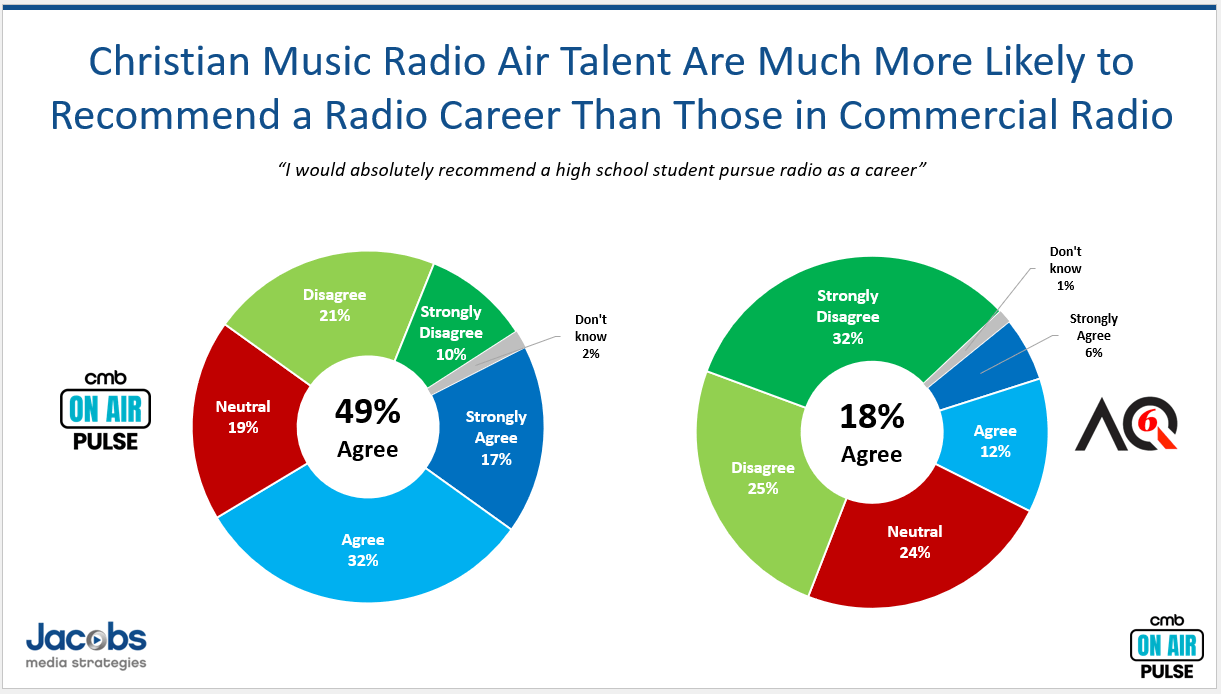
If you buy into the notion that talent is the lifeblood of radio, today and in the future, this data can be of great value to you and your organization. Depending on how you strategize the role that personalities play in your business, a keen understanding of mindset—the things they believe about a career in radio—is of critical importance.
One common element is that personalities “just want to have fun,” an important piece of how to nurture, manage, and develop them.
Hopefully, radio broadcasters will lean more into the power of personalities to keep their stations highly rated, strong, and of great contrast to radio’s competitors in satellite, streaming, and podcasts.
So who’s on your airwaves and how are they doing?
Tomorrow 8/13 at 1pm, I’ll be presenting the top-line findings for CMB’s On Air Pulse study, the first of its kind research survey exclusively among Christian radio talent. The presentation will provide fascinating contrasts between talent in commercial radio vs. those working in the Christian music space. Everyone’s welcome. More information/registration here.
Originally published by Jacobs Media

